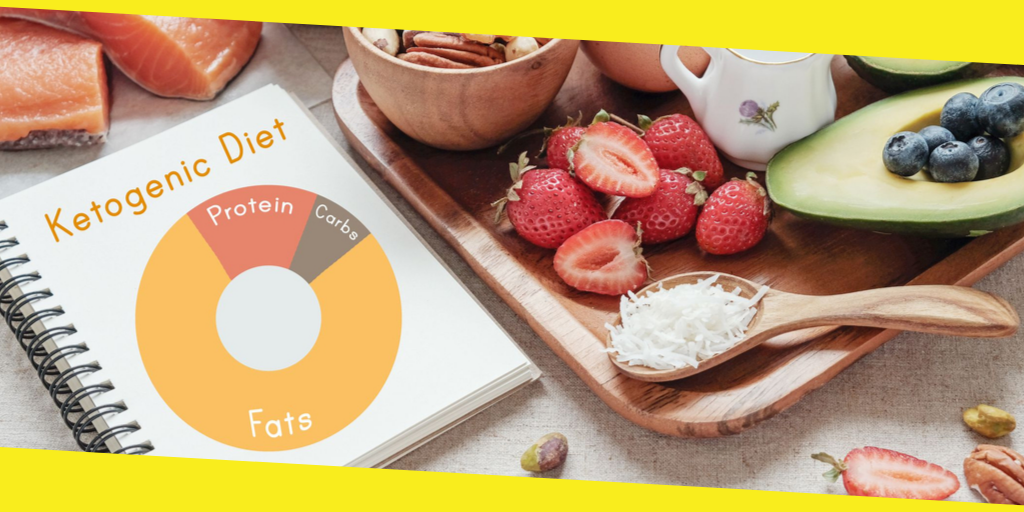Is Keto Diet Good for Diabetics?

Diabetes condition can be either Diabetes Type 1 or Diabetes Type 2. It affects blood sugar levels but can be managed using a healthy diet. Keto diet works for diabetes patients; it helps to lose weight and control glucose levels in the blood. The keto diet includes very low carbs, more healthy fats, but moderate protein. It helps to support healthy blood sugar. It contains not more than 30g of carbohydrates in a day. This makes the body burn stored fat as a source of energy, and it produces ketones, which leads to weight loss. But every diabetic person needs to talk to their doctor before following this diet. Besides, any drastic adjustment inn diet can have devastating health impacts. So, talk to your physician before giving it a try.
Contents
ToggleHow Does Ketogenic Work?
A ketogenic diet keeps blood sugar levels low by encouraging the breakdown of body fat into an energy source called ketones. You avoid starchy foods and instead stick to more fatty foods and moderate proteins. Lower intake of foods rich in carbs eliminates spikes in blood glucose, and diabetics do not need to use insulin to control blood sugar. People who are already using insulin reduce their doses when on a keto diet. It lowers the risks associated with diabetes, especially due to weight reduction. Apart from helping those with diabetes already, it can reverse prediabetes.
Meal Planning in Keto Diets
A keto friendly fruits diet is strict and based on low carbohydrates. This is what helps diabetes patients as it encourages moderate proteins and fat-rich content. As long as you follow the diet strictly, you will not miss out on any nutrition. It meets all nutrient needs while avoiding carb-rich food, which often spikes glucose levels. In a standard keto diet, you should take between 20 grams and 50 grams of carbs per day.
The most significant percentage of the diet is fat content, which falls between 70% and 80% of your food, while proteins make 10% to 20%, and carbs should not be more than 10%. You should never consume any processed foods; all ingredients must be natural. Here are some of the foods that should be in your ketogenic diet.
- Low carbohydrate veggies: The golden rule in keto diet if to eat deficient carb foods. Some of the vegetables to avoid include corn and potatoes.
- Eat eggs. Yes, eggs are not rich in carbohydrates and are a great source of protein.
- Meats: In keto diets, fatty meats included, but in moderation, because they can be dangerous to the heart. Besides, watch out for the number of proteins you eat because if consumed in high levels, the liver can convert them in blood sugar. This will definitely lead to elevated blood glucose levels.
- Healthy fat sources such as nuts, avocados, seeds, and olive oil. This diet requires high fats, but it is vital to choose healthy options over fats found in sausages, bacon, fried cheese, and red meat.
- Plenty of fish. It is one of the healthiest sources of protein that you can include in your keto diet.
- Eat berries moderately. They are rich in vitamins, fibre, antioxidants, and minerals.
Benefits of Ketogenic Diet
A ketogenic diet comes with numerous benefits. But most people find it hard to follow it strictly enough to achieve the desired results. Here are some of the benefits you get from the diet.
- Ketogenic diets help diabetic patients lose weight. The body turns the stored fats into energy without giving you hunger pangs. You will not suffer from crazy cravings for carbs and can easily stick to your diet.
- As long as you follow the keto diet as recommended, which means going for healthy fats, your heart’s health will improve. Reduction of carbs lowers cholesterol in the body, which reduces the risks of most cardio-related diseases.
- Ketogenic diets decrease blood sugar. Carbohydrates turn into sugar in the body, and they are the leading cause of sugar spikes. When you reduce carbs in your diet remarkably, it helps to manage diabetes and reduce the number of drugs you have to take every day — no more dependency of medication to function generally as keto diets control blood sugar.
How Safe Is Keto Diets for Diabetics?
Keto diet is safe for diabetics, and gives good results, primarily due to weight loss. Patients with diabetes type 2. For patients with diabetes type 1, you should talk to your doctor as medication may change. While a keto diet is beneficial; it has some side effects that you should know:
- When starting a keto diet, there is a high risk of suffering from hypoglycemia, a condition where sugar levels dip very low. You should keep checking blood glucose levels to prevent this and take medication on time.
- Choosing to eat unhealthy fats can lead to heart diseases. Go for healthy options to avoid raising cholesterol in the body. The best options include canola and olive oils along with nuts and avocados.
- The diet restricts many foods, including several vegetables, fruits, and dairy products. This makes you miss out on some essential nutrients, but with the help of a nutritionist, you can follow healthy nutritional Ketosis, which ensures the body doesn’t miss out on anything critical.
The Bottom Line
Keto diet is worth trying if you have diabetes. However, talk to your doctor before you switch to this diet. It is excellent if you need to lose weight while managing diabetes as it reduces symptoms and needs to use medication.
There are so many low carb diets out there. Nevertheless, ketogenic continues to be outstanding. For more than a century, keto has been used to treat such conditions as epilepsy in young children. However, its recent surge in popularity is attributed to its effectiveness in weight loss. It has helped many shed weights successfully, apart from giving other health benefits such as reducing conditions of diabetes type 2. But to benefit fully from keto, the effort is required. You must ensure you always are in Ketosis.
You may like this
Recommended For You
5 Simple Steps to Prevent Corona Virus
Most Inside
Most Inside offers high-quality recommendations and valuable updates to enhance all aspects of your life, providing premium guidance and enriching experiences.




